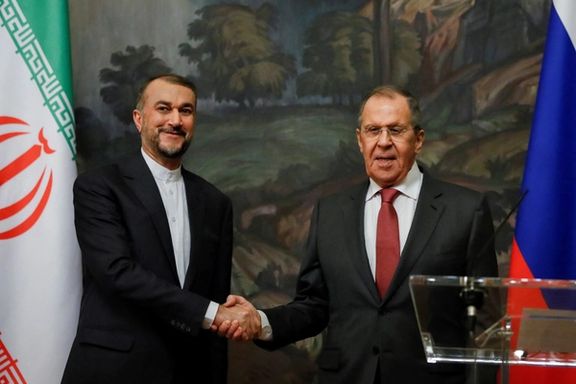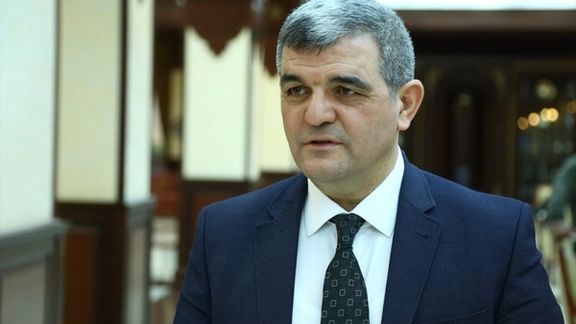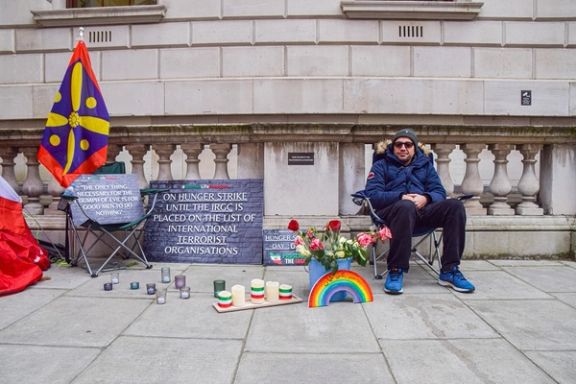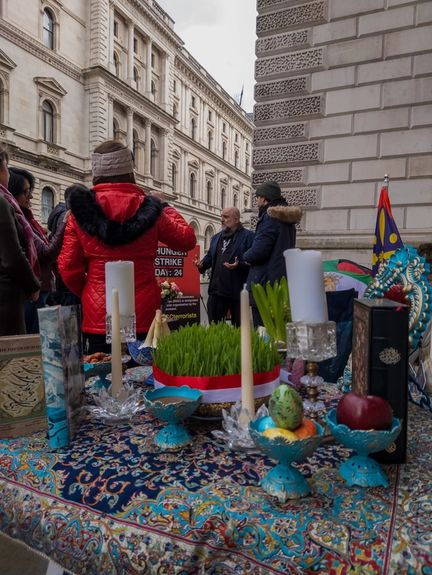Tehran Rejects Any Change In Geopolitics Of Region: Iran’s FM

Iran’s foreign minister visiting Moscow Wednesday said Tehran rejects any change in the geopolitics of the region, referring to the Armenia-Azerbaijan conflict.

Iran’s foreign minister visiting Moscow Wednesday said Tehran rejects any change in the geopolitics of the region, referring to the Armenia-Azerbaijan conflict.
Hossein Amir-Abdollahian told a joint press conference with his Russian counterpart that the Islamic Republic believes the continuation of tension in the Caucasus region is not to the benefit of the Republic of Azerbaijan and Armenia, advocating a dialogue to resolve differences.
Amir-Abdollahian arrived in Russia on Tuesday to hold talks with the country's Foreign Minister Sergey Lavrov over different issues.
During the joint press conference, Lavrov said he hoped what he called "frictions" between Azerbaijan and Iran would soon be resolved.
Relations between Azerbaijan and Iran, which has a large population of ethnic Azeris in its northwest, have been strained in recent months after Baku announced plans to open formal diplomatic ties with Israel.
Meanwhile, Azerbaijan's State Security Service said on Wednesday that it was investigating "a terror attack" after a lawmaker with strong anti-Iranian views was wounded in a gun attack at his home.
Regarding the nuclear deal with the West the Iranian foreign minister said Tuesday that “the window of dialogue is still open and one of the topics of the conversation with Lavrov was the JCPOA and the return of parties to their commitments.”

Azerbaijan Republic’s interior ministry is investigating an assassination attempt on Fazil Mustafa, a lawmaker, who was injured by gunfire in Baku.
A statement by the Azerbaijani Prosecutor General's Office on Tuesday said Mustafa, who is the head of Azerbaijan's Great Order Party, was attacked by unknown assailants outside his house in the Sabunchi district of capital Baku.
Covering the news of the attack, the Telegram channel affiliated to Iran's IRGC called him "a staunch enemy of Shia Muslims."
"Mustafa received gunshot wounds from an unknown person or persons near his house in Baku. The lawmaker was hospitalized with gunshot wounds in the leg and shoulder," the Interior Ministry said.
Later, the Azerbaijani Parliament said his state of health is assessed as stable.
"A criminal case has been opened following the terrorist act against Azerbaijani MP Fazil Mustafa, Azernews reported, citing the State Security Service of Azerbaijan.
"Comprehensive urgent operational-search measures are being carried out in order to identify the person who committed the terrorist act, and other persons involved in the crime, and bring them to criminal responsibility," the Azerbaijani State Security Service said.
Relations between Tehran and Baku soured more after a gunman assaulted Azerbaijan’s embassy in Iran’s capital Tehran in late January prompting Azerbaijan to evacuate staff and family members from the country. Baku also detained 19 people, alleging that they were working for Iranian intelligence services.
As in some Middle Eastern countries, Tehran sees Azerbaijan’s majority-Shia population as fertile ground for propagating its narratives and creating local proxies to influence Baku’s decision-making.

After 35 days on hunger strike, a dual British-Iranian citizen's campaign calling on the UK government to designate the IRGC is finally gaining ground.
Vahid Beheshti has been battling the bitter winter outside the UK Foreign Office to raise awareness for the need to designate the Iranian terror group responsible for the deaths of hundreds of Iranian citizens since September.
He has got the attention of key political figures and has been joined by supporters hoping to force the UK government to take action on the brutal security forces.
On Monday, he met with the Minister of State for Security, Tom Tugendhat. Beheshti said, "He expressed his concerns for my health and emphasized that the Government's position is to proscribe the IRGC, but could not share the timescale in which this would happen."
His simple camp outside the Foreign Office has become a meeting place for activists, with others joining him.
His campaign has proven so successful that his name has been frequently mentioned during the sessions of the UK House of Commons. He has repeatedly urged UK lawmakers to hold official meetings with him instead of unofficial visits to his corner, to raise the profile of the issue to the highest echelons
Beheshti’s campaign is even reaching back home.
A boy in Iran holds a placard that urges Beheshti to break his hunger strike
As his body is getting weaker, temperatures at night dropping to freezing, his determination is growing stronger as he has vowed not to break the strike until the IRGC is listed as a terrorist organization.
The 46-year-old journalist is surviving on a daily diet of one cup of coffee, a few cubes of sugar, some salt and “plenty of water”.
“A policy of appeasement with Iran's Islamic Revolutionary Guard Corps has not worked in the last 44 years, and it will never work going forward,” Beheshti said last week, calling on Sunak, for “strong leadership” and to stand by his pledge to designate the group before his recent election.
Before embarking on his hunger strike, Beheshti held several meetings with British lawmakers, pleading with them for the proscription, but no action was made.
The tipping point came in February when Iran International was forced to close its London studios after repeated death threats from the regime.“The main point I highlight to British politicians is that their country’s principles are under threat today... I cannot understand why the British police, with all their power, cannot protect journalists against IRGC threats,” Beheshti said.
The Revolutionary Guard is the Islamic Republic’s leading military, intelligence and internal security juggernaut, responsible for cracking down on dissent inside Iran and managing the proxy militias throughout the region including the Houthis in Yemen which have caused devastation to the country.
Beheshti has been actively raising the voice of Iranians among the international community with his numerous interviews, speeches and video messages to global events on the uprising in Iran.
He says the designation is the first practical step toward further isolation of the Islamic Republic and the final overthrow of the regime.
Rallies against the IRGC have taken place globally including just last week in Brussels. The UK’s current list of 78 proscribed terrorist organizations includes Hamas, Hezbollah, and the Kurdistan Workers Party (PKK).
Several countries including the US, UK and EU have been cautious to designate the IRGC for fear it will further alienate the regime and in turn, limit negotiating capacity regarding its nuclear program.
In December, members of the UK House of Commons unanimously voted for a motion that urges the government to proscribe the IRGC but it has split the House.
Prominent Iranian opposition figures have repeatedly called on London to blacklist the Guards with exiled Prince Reza Pahlavi describing the move as to be akin to “pulling out the regime’s biggest tooth.”


Azerbaijan's State Security Service said on Wednesday that it was investigating "a terror attack" after a lawmaker with strong anti-Iranian views was wounded in a gun attack at his home.
Fazil Mustafa, a member of the Azeri parliament, had been hospitalised after receiving wounds to his shoulder and thigh after being shot with a Kalashnikov assault rifle on Tuesday night, the security agency said in a statement.
His life was not at risk, it said, and a criminal investigation had been opened to identify the perpetrator.
Azeri news site haqqin.az quoted Mustafa, 57, as saying from hospital that he had been hit by two bullets while driving into his garage.
Mustafa was known in parliament as an outspoken critic of Iran, Azerbaijan's southern neighbour, with which Baku has often had strained relations. The State Security Service noted Mustafa's anti-Iran stance in its statement on the incident.
Relations between Azerbaijan and Iran, which has a large population of ethnic Azeris in its northwest, have been strained in recent months after Baku announced plans to open formal diplomatic ties with Israel.
In January, Azerbaijan closed its embassy in Tehran after what it called a "terrorist attack" that killed the embassy's head of security.
Report by Reuters

The spokesman of Iran’s Revolutionary Guard (IRGC) has called on the Palestinians to take advantage of recent protests in Israel to destabilize the country.
Brigadier General Ramezan Sharif said on Tuesday that “the occupied territories are the scene of confrontation of a movement within the Zionist regime that wants to stand against the totalitarianism of another wing.”
“This is a golden opportunity for the Palestinian fighters to take advantage of the situation,” he added.
The IRGC commander’s clear instigation of Palestinian youths comes as state media in Iran are also heralding that the domestic disagreements in Israel would lead to the “end of Zionism”.
Gen. Sharif told local media that Jerusalem's "liberation" is near, "thanks to the Palestinian struggle", and to Iran's Supreme Leader Ali Khamenei who "is the flag-bearer" of the fight against Israel. He also said that IRGC Gen. Qassem Soleimani played an important role in driving the "resistance". Soleimani was targeted and killed by the United States in Baghdad in January 2020.
The Islamic Republic officials have rejoiced by the political dispute over Prime Minister Benjamin Netanyahu's effort to overhaul the country's judicial system.
Hardliner media, mostly controlled by the IRGC began publishing daily articles about a "looming civil war" in Israel and predicting its demise in the near future.
On January 4, newly-appointed Justice Minister Yariv Levin announced plans to reform Israel's judiciary, including limiting the power of the Supreme Court, and granting the governing coalition a majority on the committee that appoints judges. Following the announcement, several organizations have staged mass protests for 12 weeks now.

Iran’s currency has dropped by 20 percent since March 10 when an agreement was signed with Saudi Arabia to restore relations, injecting optimism into the economy.
The rial was trading above 530,000 to the US dollar, and 570,000 to the euro Wednesday, as most offices and businesses are closed due to long Nowruz holidays.
When Tehran and Riyadh announced the Chinese-brokered deal to restore diplomatic relations earlier in the month, the rial rose to 440,000 to the dollar, as the deal was seen as a step toward reducing Iran’s international isolation.
However, the initial euphoria in Tehran has given way to more realistic expectations, that the agreement might not have been a major foreign policy shift to impact the economy.
The fact remains that the government is facing a very large deficit, by some estimates more than 50 percent of its budget, without any immediate outlook for a major domestic or international breakthrough. More regime insiders are criticizing the government for lack of a plan to deal with the crisis and mismanagement of the economy.
Iran needs to resolve its disputes with the United States to end crippling oil export and international banking sanctions, as its oil-based economy faces a serious hard currency shortfall.
Talks to resolve differences on Iran’s galloping nuclear program ended in a deadlock last September, with Washington blaming Tehran for intransigence. Since the failure, the Biden Administration has been saying that reaching a nuclear deal is not its priority any longer.